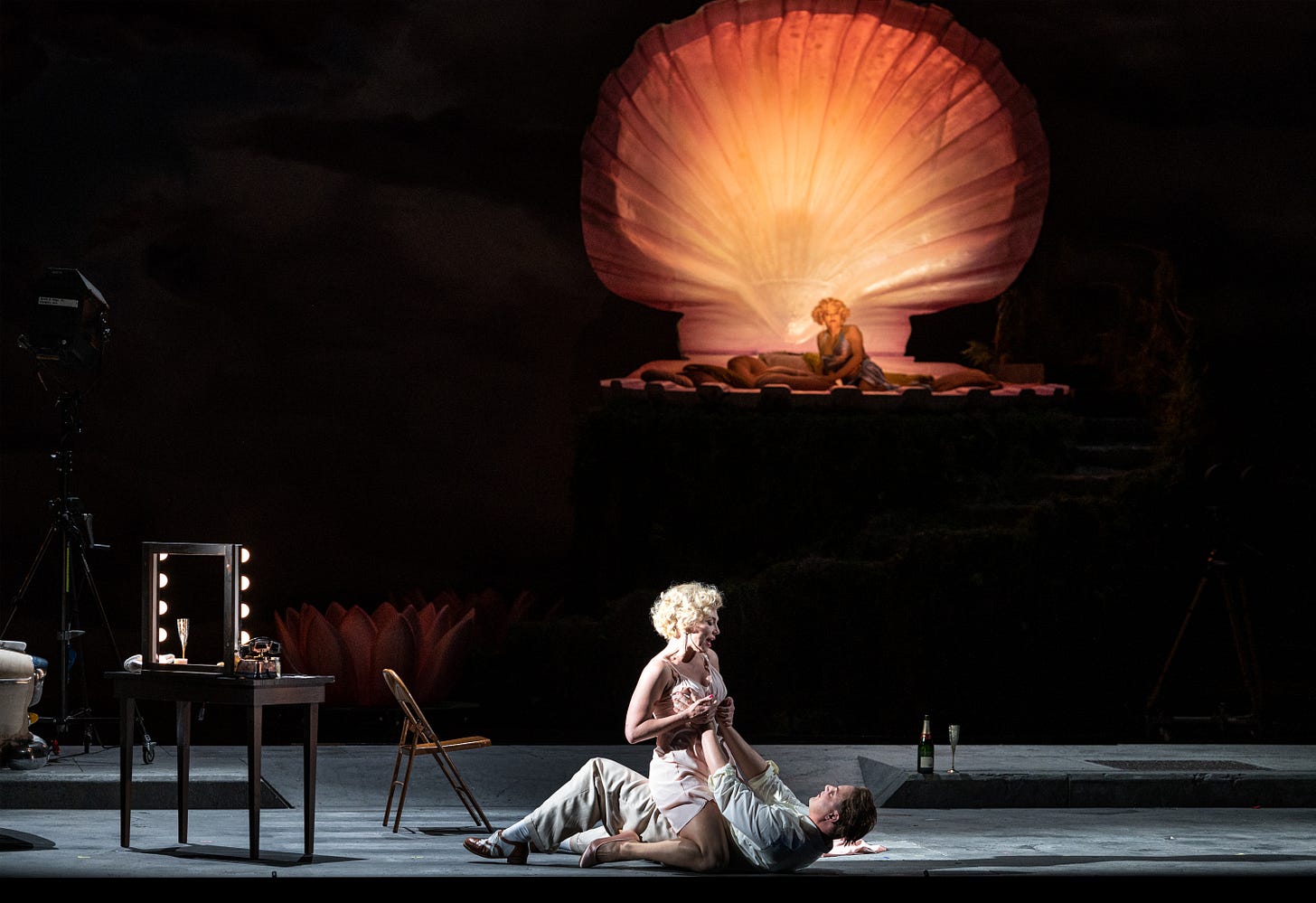This review appears in the August edition of Opera magazine and is republished here by permission of the Editor
Rusalka (Johanni Van Oostrum, left) sleeping rough outside the cinema, while the Water Goblin (Maxim Kuzmin-Karavaev) looks on from outside “Jezi’s Hair and Nail” Bar. Picture by Clärchen and Matthias Baus
Rusalka was last staged by Dutch National Opera in 1976 (Teresa Stratas sang the title role), when the company was homeless. Dvořák’s operatic masterpiece made its debut in Amsterdam’s Muziektheater to open the Holland Festival, in a staging by Philipp Stölzl in collaboration with the co-director Philipp M. Krenn, set designer Heike Vollmer and costume designer Anke Winckler on June. In their concept, Rusalka goes to Hollywood as Stölzl and Krenn relocate the action to a dingy suburb of New York. A cinema showing The Prince and the Mermaid is flanked by an adult store and “Jezi’s Hair and Nail Bar”: Raehann Bryce-Davis’s hardworking Ježibaba is on stage for most of the evening primping and preening her male and female clients.
Rusalka (sung by Johanni van Oostrum) is initially discovered sleeping rough at the entrance of the cinema. Possibly drunk, or drugged up to the eyeballs, she hallucinates a future with the male romantic lead of the film, “Eric Prince” (Pavel Černoch). His film mermaid co-star “Carlotta Knezna” (Annette Dasch) is her nemesis, the Foreign Princess.
Rusalka (Van Oostrum) mimics a “Botticellian Marilyn Monroe” as the Prince (Pavel Černoch) and Foreign Princess (Anette Dasch) make love in the foreground. Picture by Clärchen and Matthias Baus
The German team’s post-Herheim scenario for the opera is brilliantly realized, and at considerable expense. Already in the prelude we see a trailer of “The Prince and the Mermaid” with Černoch costumed like Lieutenant Pinkerton and Dasch emerging from a scallop shell like a Botticellian Marilyn Monroe, performing a dance number with showgirls and sailors. The tone is set from the start, and I suppose there is some validity in juxtaposing the Hollywood glamour of the Prince’s realm with the run-down New York backstreet ‘reality’ of Rusalka’s environment. Even if Rusalka as prostitute/wannabegood-time-girl is nothing new in productions of the opera, the German team’s stagecraft could hardly have been more entertaining and involving. For the gruesome-looking makeover to transform Rusalka into a Carlotta Knezna lookalike - which included a pneumatic boob job - Jezi’s salon rose on the Muziektheater’s hydraulic machinery to reveal a basement resembling more a torture chamber than a cosmetic surgery clinic. In operatic London scenic wonders such as this are seldom seen. Whether Rusalka needs them, of course - or the constant toing and froing of street walkers (the wood nymphs, inevitably), cops and mobsters in league with the Water Sprite - is another matter. Indeed, in several sequences one felt that the directors were afraid of boring the audience with this long opera sung in Czech (the dancers naturally stole the limelight at the Prince’s Act 2 ball); and, like most cutting-edge directors, they are terrified of magic in opera. Yet although it was never quite clear why a matinee idol wanted to die for a glamourized down-and-out Carlotta-copy rather than the real thing, the staging worked on its own terms. Rusalka returned to the entrance of the cinema (now showing a sequel, “The Mermaid’s Return”) broken by her experience, and died from a self-injected heroin overdose.
Ježibaba (Raehan Bryce-Davis) consoles a disillusioned Rusalka (Van Oostrum) in Act 3 Picture by Clärchen and Matthias Baus
Van Oostrum sang the part as affectingly as anyone I have heard, with a substantial lyric soprano, and Dasch sang powerfully as her doppelgänger model. Černoch, who sang the Prince in Herheim’s staging 11 years ago, can still manage the high tessitura of the role, but with audible effort today. Bryce-Davis lacked the fruity contralto tones of an ideal Ježibaba, but she was a lively comic presence, while Maxim Kuzmin-Karavaev was a younger-than-usual gangster Water Sprite. The trio of Wood Nymphs sang euphoniously, so one regretted the cut of their exquisite Act 3 number. But that was the one black mark against Joana Mallwitz’s expert handling of the score and the Royal Concertgebouw Orchestra’s magnificent playing of it. I feel privileged to have heard two great orchestras—this and the Czech Philharmonic—in Dvořák’s masterly score this season, and while the latter evoked Bohemia’s woods and watery places to near-perfection, the Concertgebouw players hardly yielded to them in the beauty of their playing. The Dutch horn section excelled itself, giving us a sense of Dvořák’s natural world even if it was nowhere to be seen on stage.






